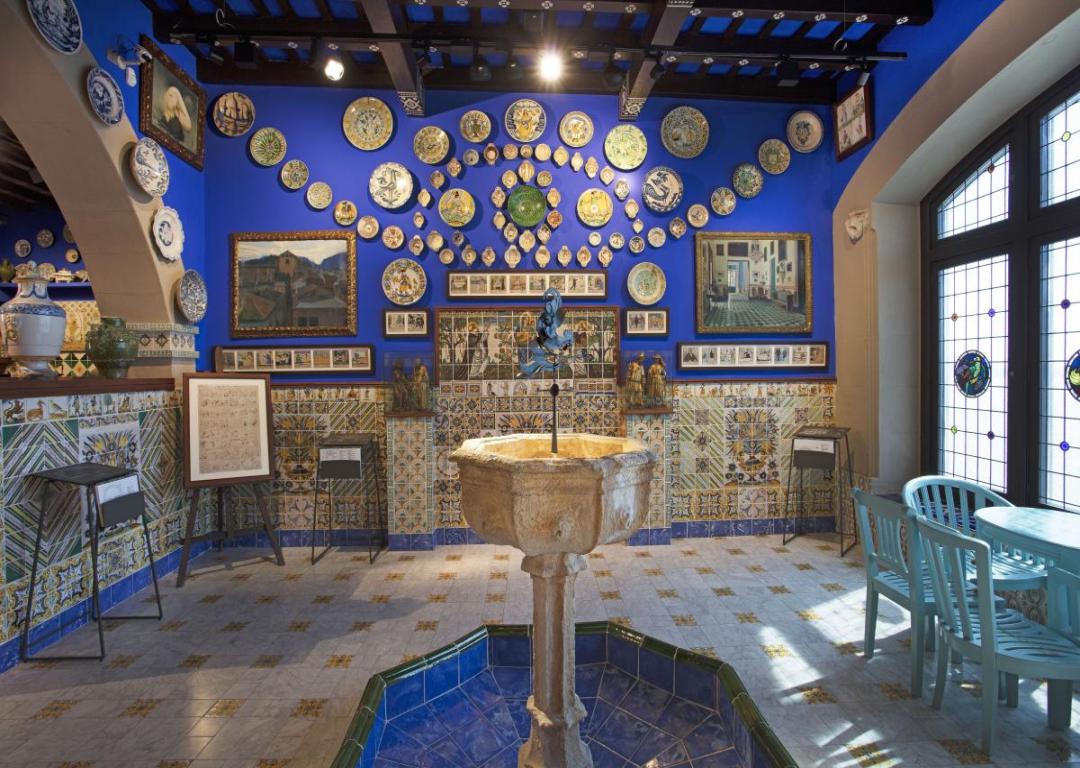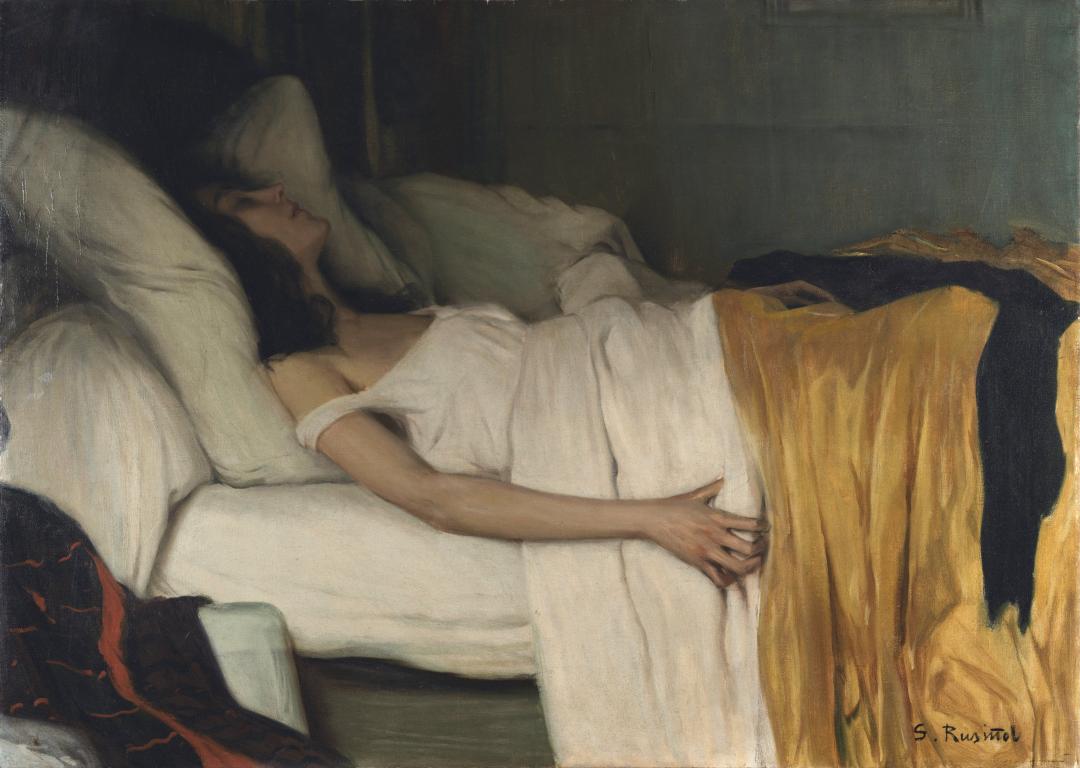Modernist Art in Sitges
Sitges was the city where the great expansion of the modernist movement began in Catalonia. The modernist processions held in Sitges to receive paintings by El Greco are famous. These were carried in a lay procession from the station to the Cau Ferrat .
Modernism was a cultural and aesthetic current that broke with previous movements, exalting the nature and beauty of everyday things by incorporating new techniques such as glass and iron. It had different names in different countries; Jugendstil in Germany and Nordic countries, Sezession in Austria, Nieuwe Kunst in the Netherlands, Liberty or Floreale in Italy, Modern Style in Anglo-Saxon countries and Art Nouveau in France and Belgium.
Modernism tried to reach all aspects of life and that is why it gave so much importance to beautiful objects. Giving a great boost to the decorative arts. It was important to have beautiful chairs, furniture, glasses, spoons, brooches and paintings.
Barcelona is one of the great modernist cities although it spread throughout Europe, being the base of the new avant-garde at the time for surrealism.
From post-impressionism in painting there is a coincidence of the pictorial interests of the Spanish post-impressionists (Ramón Casas, Santiago Rusiñol) who are the greatest exponents of this artistic trend in Spanish painting.
Santiago Rusiñol was a true cultural agitator both for the articles he published, the books he wrote and the paintings he created. His own life was truly a persistent attempt to Épater le bourgeois (to shock the bourgeois or leave them astonished).
Rusiñol, along with the rest of the Barcelona modernists, advocated Sitges' rise to modernist stardom. Converting it into a meeting place for bohemian life and originating the beginning of European tourism to Sitges. Favored by its microclimate, the openness to the sea and the mentality of its inhabitants.
There are very important modernist architectural examples in Sitges.
If you walk through the streets of the historic center of Sitges and towards the Cau Ferrat you will be able to enjoy encountering these works. Here I propose a modernist route of the modernist buildings and monuments of Sitges:
- Josep Miravent i Gatell House (Font Llopart) c/ Rafael Llopart 1. Sitges
- Casa Isabel Ferret Martorell Passeig de la Ribera 29. Sitges
- Francesc Robert Yarzabal House Passeig de la Ribera 18. Sitges
- Casa Marina Planas Passeig de la Ribera 17. Sitges
- Casa Simó Llauradó Passeig de la Ribera 2. Sitges
- Monument to Greco Passeig de la Ribera/ Carrer de Sant Pau. Sitges
- Casa Pere Carreras i Robert c/ Francesc Gumà 23. Sitges
- Antoni Carreras i Robert House c/Francesc Gumà 17. Sitges
- Casa Manuel Planas i Carbonell c/ Illa de Cuba 21. Sitges
- Casa Bonaventiura Blai (Villa Avelina) c/ Illa de Cuba 37. Sitges
- Joan Robert i Brauet House c/ Sant Bartomeu 28. Sitges
- Villa Remei Avinguda Artur Carbonell 25. Sitges
- Villa Subur Avinguda Artur Carbonell Sitges
- Villa Havermann Avinguda Artur Carbonell 11-15. Sitges
- Bartomeu i Carbonell i Mussons House Plaça del Cap de la Vila 7-8. Sitges
- Casa Gorgas c/ Major 21. Sitges. Sitges
- Joaquim Duran i Barraquer House Carrer Major 23. Sitges
- Old market. Bacardi House Plaça de l´Ajuntament 11-12. Sitges
- Monument to Doctor Robert Plaça de l Ajuntament. Sitges
Santiago Rusiñol i Prats
Barcelona, February 25, 1861 – Aranjuez, June 13, 1931
He was a Catalan painter, writer and playwright who came from a wealthy family of textile industrialists. Santiago Rusiñol studied at the Barcelona Watercolor Center of which he was one of the founders and was a disciple of Tomás Moragas.
At the beginning of his career he included the human figure but later, influenced by the impressionists, the themes of his work focused on landscapes, portraits and symbolic compositions of modernist inspiration.
Orphaned at a very young age, he was raised by his grandfather, which Rusiñol later reflected in L'Auca del Sr, Esteve . His grandfather tried to instill in him the values of respect, discipline, a well-thinking attitude and bourgeois values, but Santiago Rusiñol was always a bohemian . A bohemian who could not afford to be one without having to go through the miseries of bohemianism at the time.
All his life he was in a constant struggle with the Phoenicians who only valued things by their price, as The Little Prince by Antoine de St Exupery points out. Rusiñol became a well-known character in Barcelona for his customs, way of dressing, hairstyle, tastes and defiant attitude. In Barcelona he frequented the gatherings at the Els Quatre Gats café. He also wrote for La Vanguardia and L'Esquella de la Torratxa.
Thanks to his social position he was able to make several trips. He lived for a few years in Paris, Montmartre, where he settled with other Catalan artists (Ramón Casas and Zuloaga) and had teachers such as Puvis de Chavannes and Carrière. The only works he wrote in Spanish were Impressions of art and a series of articles titled Desde mi mill. Zuloaga sparked his interest in El Greco .
Cau Ferrat deserves special mention. In 1892 Rusiñol bought a fishermen's house and the following year the adjacent one (from the 14th century). On the site resulting from these two buildings he had Francesc Rogent build his studio-workshop. He named her Cau Ferrat for; Cau which means lair where poetry lovers could take refuge and Ferrat for his collection of wrought iron. Here he hung the paintings acquired in France by El Greco .
Its official inauguration on July 25, 1894 (San Santiago) included a performance by the Sitges municipal band.

 Written by Hello Homes Sitges
|Updated: 06-12-2024
| 0 Comments
Written by Hello Homes Sitges
|Updated: 06-12-2024
| 0 Comments

